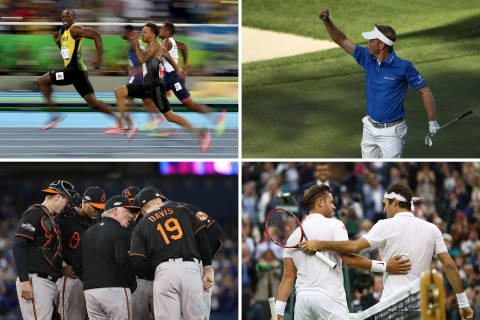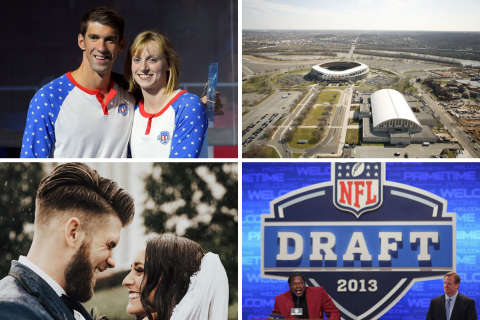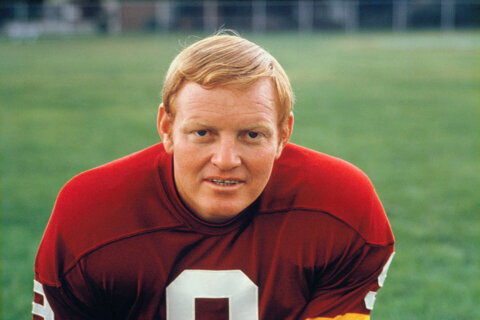WASHINGTON — Sports don’t really matter.
That may seem a strange sentiment coming from a sportswriter, but I think anyone who works in our business and is self-aware enough to see past his or her own face understands this. This isn’t to say that certain events can’t have profound implications, but they are also often overblown. Wins and losses can alter the trajectory of franchises, of entire cities and regions, both in terms of civic identity and budgetary discretion. But for every quirky hop through a first baseman’s legs that defined a generation of Bostonians, there’s a myth built around a hanging forkball ruining one pitcher’s life.
More practically, seen from afar, through a wide-angle lens, single outcomes are irrelevant. The difference in a morning following a Washington team’s loss and a win is almost imperceptible outside the Beltway.
The first time I realized this, in earnest, was the second-to-last scheduled day of my internship with the Oakland Athletics during the summer between my senior year of high school and my freshman year of college. I was having a blast, working for a tremendous team that almost never lost at home, featuring Jason Giambi, Johnny Damon, Jermaine Dye and the blossoming big three starters, Tim Hudson, Mark Mulder and Barry Zito. A month before Derek Jeter’s backhand flip would upend World Series hopes, the A’s were chugging along to a 102-win season, and I was an 18-year-old on cloud nine, soaking it in from the press box and clubhouse on a daily basis.
We had a night game scheduled that Tuesday, the penultimate day of my internship, so I was planning to sleep in, then roll the 20 minutes down Highway 880 to the Oakland Coliseum in the early afternoon as I always did for the 7:05 p.m. first pitch. Instead, I was awoken early by my mother, screaming hysterically. She dragged me, bleary-eyed, up the stairs to the television just in time to see the second plane hit the South Tower.
I always knew I wanted to work in sports, but my passion took a back seat as I traveled downstate to school, only re-emerging as the hysteria of our society calmed slowly in the years to follow. But I was always more acutely aware of ways in which things had changed. The metal detectors at the gates, God Bless America during the seventh-inning stretch. Eventually, these things became our new normal, and we settled back into something resembling our old reality. It felt ok to exhale, to breathe a little easier, to coast a bit.
That all changed again this year. While our national politics have been toxic for a good while, they didn’t really filter down to a human-to-human level until the past few years, as social media opened up avenues for total strangers to engage in verbal warfare. Similarly, sports and political discourse devolved over that time into contests of who can scream louder, longer to drown out the other side, no matter the content or factual correctness of what is being said.
Meanwhile, the internet has given anyone who can make something that looks like a news site a voice credible enough to be believed by those who want to, as has social media. But there’s little to no vetting of truth, as falsehoods quickly take off if a headline is salacious enough, regardless whether or not it’s accurate. Many people don’t even grasp what “fake news” is, simply labeling anything that doesn’t confirm their biases as such.
It all came to a head in the most divisive presidential election of our lifetimes, one which has left our country seemingly split in half with a smoldering fissure between battle lines.
And that’s the odd paradox of 2016, as a sportswriter. Regardless of your political leanings, 2016 was a very bad year, full of ugly partisanship, an ongoing genocide halfway around the world, and, yes, sure, a seemingly large number of celebrity deaths. It was also perhaps the greatest sports year in a century.
This was the year when the Chicago Cubs, baseball’s eternal losers, finally did the unthinkable and won the World Series. It was the year Cleveland, America’s punchline for sports futility, quenched its championship drought on the back of hometown hero LeBron James following his return home. It was the year 500-1 shot Leicester City came from some yet-to-be-discovered dimension on the other side of nowhere to win the Premier League.
Collectively, it was like a hand from every corner of the sports world came together to push a giant, red reset button on everything we used to know.
Then Election Day stormed through and overshadowed every seemingly impossible achievement before it. A Cubs World Series victory should have been the singular news story of the calendar year, the kind of once-in-a-lifetime event that draws those from outside sports to remember the Cubs fans in their lives, dead and alive, and what it meant (or would have) to them. Instead, it was washed away, like the refuse of any other news cycle, just nine days later.
In a year when the sports stories were so incredible, they still paled in comparison to the rest of what happened in the world around us.
The word “revolution” comes from Latin, its etymology rooted in the movement of the planets around the sun. In the last trip around the sun, our sports world and our political one have been uprooted in unprecedented ways leaving us standing on freshly tilled earth that looks unfamiliar to the ground we’re used to standing on.
The sports world’s revolution has in many ways mirrored that of the country, discarding long-accepted norms and leaving us looking ahead at a much cloudier, uncertain future. In addition to historic championships, athletes also brought new social movements, and strong reactions to them. I don’t believe for a second the 44 percent of people who claimed in a Yahoo/YouGov poll that they would actually stop watching NFL games if more players followed Colin Kaepernick’s lead in kneeling during the national anthem. But the fact that so many would even suggest so is still telling of our rifts.
That’s why we owe it to ourselves not to coast in the new year. Our societal divisions will require a better understanding of all sides, from all sides. For me, that means reading more, not just the latest thing that drops into my newsfeed, but about the history that led us to where we are. The uncharted waters ahead may be new to us, but they aren’t entirely foreign to human history. Broadening our sources of information — and doing more listening and reading than talking — would be a good step for everyone.
If we’re really living in a post-truth world, perhaps sports will help serve a purpose not only in grounding us and bringing us together as communities in fandom, but also as last bastion of agreeable fact. The scoreboard is never in doubt. Russian hackers can’t tinker with the final standings. No matter what any coach or commentator says, the games will play out with a definitive winner and loser that can’t be manipulated by either a government or media narrative.
In that sense, perhaps sports can provide some sanity. But they can’t be purely escapist. It has always been narrow-minded to pretend that politics don’t have a place in sports; to ignore that Jesse Owens upstaged Hitler in his own Olympics; to overlook that Jackie Robinson broke baseball’s color barrier 17 years before the Civil Rights Act was signed; to not see that, even today, the USWNT is at the forefront of fighting for equal pay for women in America. Sports have always been a reflection of our society, and they always will be.
In 2017, more than ever, we can’t just watch sports to get away. We should watch them — and listen — to learn more about where we are, where we’re going, and how we can all be better in helping one another get there.







